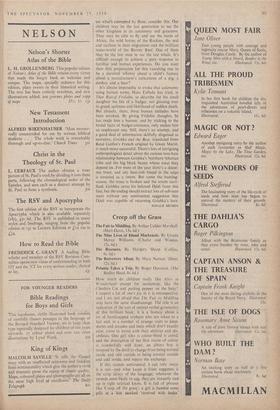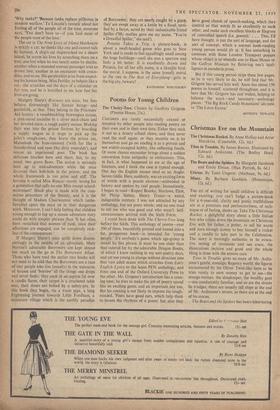Creep off the Grass
The Fair to Middling. By Arthur Calder-Marshall. (Hart-Davis, 13s. ad.) How 'much do children really like .4lice in Wonderland—except for incidentals, like the Cheshire Cat and putting pepper on the baby? I suspect a lot of one's joy in it is retrospective: and I am just afraid that The Fair to Middling may have the same disadvantage. The title is an indication of the sort of mental-verbal gymnastics of this brilliant book; it is a fantasy about a lot of handicapped orphans who are taken to a fair and, in a number of strange visits to peep- shows and arcades and tents which don't exactly exist, come to terms with their abilities and dis- abilities. One girl who is colour-blind is cured, and the description of her first vision of colour is wonderfully well done; an albino boy is tempted by the devil to change from being normal inside and odd 'outside to being normal outside and odd inside, and rejects the exchange.
If this sounds sentimental, I can only swear it is not—and what keeps it from sogginess is the 'crisp idiocy of the language; whenever the strands seem likely to sag, they are instantly tied up in tight satirical knots. It is full of phrases like 'Creep off the grass': a girl is handed some pills in a box marked 'received with tanks.'
`Why tanks?' Because tanks, replace pillboxes.in modern warfare.' To Lincoln's remark about not fooling all of the people all of the time, someone says, 'You don't have to—if you fool most of the people most of the time.'
The cat in The Nine Lives of Island Mackenzie is strictly a cat; he thinks like one and cannot talk to humans. A ship's cat shipwrecked on a desert island, he scores his lives by scratching them on a tree; one lost when he was nearly eaten by sharks; another when a stranded woman passenger tries to drown him; another in an encounter with croco- diles, and so on. His perplexities arise from expect- ing his human being, Miss Pettifer, to behave like a cat : she scratches out the days of a calendar on her tree, and he is horrified to see how fast her lives are going.
Margery Sharp's Rescuers are mice; but they behave distressingly like human beings—and gentlefolk, at that. They belong to the Prisoners' Aid Society : a swashbuckling Norwegian mouse, a pink-eared socialite in a silver neck-chain and her devoted slave, a rough pantry mouse. Making their way into the prison fortress by boarding a supply wagon as it stops to pick up the jailer's cough-cure, they brave the prison cat, Mamelouk the Iron-tummed ('with ,fur like a thundercloud and eyes like dirty emeralds'), and rescue an imprisoned poet. The book has delicious touches here and there, but, to my mind, two grave flaws. The action is seriously held up in mid-adventure while the mice decorate their bolt-hole in the prison; and the whole framework is too prim and stiff. The heroine is called Miss Bianca—surely wrong for a generation that calls no one Miss except school- mistresses? Much play is made with the com- mittee procedure of the Society, and it is the thought of Madam Chairwoman which (unbe- lievably) spurs the mice on in their dangerous work. Moreover, I can't help feeling that children young enough to lap up a mouse adventure story could do with simpler phrases than 'It has often been remarked that women of rank, once their affections are engaged, can be completely reck- less of the consequences.'
If Margery Sharp's mice settle down discon- certingly in the middle of an adventure, Mary Norton's admirable Borrowers are kept almost too much on the go in The Borrowers Afloat. Those who have read the earlier two books will not need to be told that the Borrowers are a race of tiny people who live (usually) in the wainscots of houses and 'borrow' all the things one drops and never finds: they cook in an aspirin lid over a candle flame, their carpet is a crocheted table mat, their doors are bolted by a safety-pin. In this book they begin, via a waste pipe, a long frightening journey towards Little Fordham, a miniature village which is the earthly paradise of Borrowers: they are nearly caught by a gipsy, they' are swept away in a kettle by a flood, terri- fied by a ferret, saved by their indomitable friend Spitler (`My mother gave me my name. "You're a Dreadful Spitler," she said').
Petunia Takes a Trip, a picture-book, is about a swell-headed goose who goes to New York and is made to feel appallingly small among the huge buildings—until she sees a sparrow and feels a bit better. It is excellently drawn and Petunia, for all her silly name, is a likeable bird; the moral, I suppose, is the same homely moral as the one in The Best of Everything—girls in the big city, beware!
KATHARINE WHITEHORN



























































 Previous page
Previous page